An estimated 18 million viewers watched on Tuesday, April 20, as Judge Peter Cahill read the verdict in the murder trial for ex-Minneapolis police officer Derek Chauvin. Chauvin was tried and convicted of second-degree murder, third-degree murder, and second-degree manslaughter in the death of George Floyd. The incident, which was recorded by numerous onlookers, has captured the attention of the nation and incited increased demands for police reform in America.
Within hours of the verdict, faculty and administrators at South Texas College of Law Houston hosted a forum for the law school community to discuss the legal, ethical, and social issues related to the case. Troy Finner, chief of the Houston Police Department, accepted an invitation to offer his insights during the panel discussion. More than 170 students joined the Zoom event, posing thoughtful questions and sharing personal experiences about their encounters with the police.
Examining the Trial
The program opened with a primer on the events of the trial. Geoffrey Corn, the Gary A. Kuiper Distinguished Professor of National Security and expert in criminal law and procedure explained each count against Chauvin and discussed potential sentencing options, noting that Minnesota sentencing guidelines mean the judge will consider only the highest offense for sentencing.
“This is a watershed moment in the history of our country and our legal system,” said Corn. “[Chauvin’s actions] were a quintessential example of depravity and the disregard for human life, and the prosecution demonstrated how to prove the case for unreasonable police judgment.”
Posing Solutions
The panelists agreed the case had a just outcome — but there is a lot of work yet to be done to ensure justice and improve citizens’ trust in the police, starting with the laws and systems that often protect wrongdoers in police agencies.
“Supreme Court precedent of using the ‘reasonable officer’s point of view’ has made it difficult to prosecute cases like this for decades,” said Professor Njeri Rutledge, who has experience as both a prosecutor and an associate municipal judge. “Most of these cases don’t even make it to charges being filed, let alone a jury. And in several instances, officers have falsified statements to protect one another.”
“In many cases, Supreme Court doctrine on qualified immunity has made it extremely difficult to sustain damages for what any reasonable person would consider abusive conduct,” Corn agreed. “If that’s going to change, states may need to provide state-level remedies to modify those standards.”
Finner applauded the actions of the Minneapolis police chief and other officers who testified and spoke up.
“Training, policies, and culture should be such that the sanctity of life is of the utmost importance,” Finner said. “The goal should be for everyone to go home safely. And we need to hold officers accountable for misconduct. When we don’t, it hurts the community, the department, and the entire profession.”
Criminal Law Professor Guha Krishnamurthi agreed. “The lack of accountability in these cases doesn’t just put citizens in danger, he said. “It puts officers in danger, too. People are more likely to escape or exercise force when they feel threatened by police.”
Finner noted that HPD places a strong emphasis on de-escalation training, guiding officers to use “cover and concealment” methods to buy themselves more time to make measured decisions during engagements. The department also has prioritized mental health intervention training and placed clinicians in patrol areas where such interventions are more prevalent.
Beyond police training and culture, panelists posited that what happens after an officer-involved shooting or incident is critical to ensuring justice.
Finner is a proponent for a national police registry for police officers, which could prevent officers who’ve been fired for misconduct from moving from agency to agency. Corn proposed that the military’s discharge model — in which a servicemember’s separation is characterized on an honor scale — might also serve police agencies well.
STCL Houston President and Dean Michael Barry emphasized STCL Houston’s commitment to continue creating opportunities for students to examine, challenge, and stand against systemic racism and injustice.
“For those of us who are students of the law, the end of this trial should not be a termination, but a beginning”, he said in a memo to students. “The question we should be asking is, ‘What comes next?’ How have our federal, state, and local laws contributed to systemic concerns within police departments? What changes to civil and criminal laws and policies might eliminate, or at least reduce, the tragic events that all too frequently have occurred? What can we do to ensure that there will not be another killing like that of George Floyd?”
“These are significant questions with no easy answers,” Barry said. “But these are questions we must ask. And society expects us, as students of the law, to help develop the answers.”



